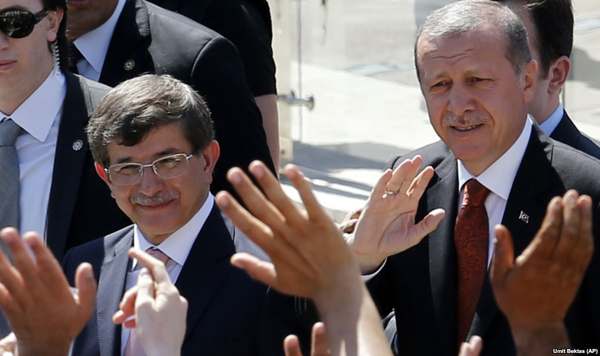Turkey’s prime minister, Ahmet Davutoglu, delivers a speech during a meeting of his Justice and Development Party. Tensions between the prime minister and Turkish President Recep Tayyip Erdogan have led to speculation that Davutoglu may resign.
For Turkish President Recep Tayyip Erdogan and Prime Minister Ahmet Davutoglu, meetings are a matter of weekly routine. On Wednesday, however, their usual state meeting was called a day early amid rumors that Davutoglu may step down because of differences with the president. Concerns over Turkey’s governmental fractures come as the country juggles security and political imperatives in a region rocked by massive instability. In particular, Turkey is dealing with Kurdish militancy, both at home and in neighboring countries, while also finalizing a deal with the European Union to absorb millions of migrants.
Despite adamant denials from the administration, rumors of mounting tensions between Erdogan and Davutoglu have long circulated in Turkey. In fact, since Erdogan chose Davutoglu, then the foreign minister, as his prime minister in September 2014, relations between them have been fraught. Prior to the appointment, the men were close. Davutoglu has been essential to shaping the ruling Justice and Development Party’s (AKP’s) mission, which envisions a powerful Pan-Islamist Turkey expanding itsinfluence in the Middle East. But differences arose over a variety of issues, including the appropriate balance of power between them. Throughout his tenure, Erdogan has steadily worked to invert Turkey’s traditional model, in which the prime minister holds the most power and the president’s role is mostly ceremonial. The recent rumblings of Davutoglu’s possible resignation — something he alluded to himself on Tuesday — follow Erdogan’s latest reduction of prime ministerial powers: On April 29, the president revoked the prime minister’s authority to appoint the AKP’s provincial and district heads.
Read also
But the rift between Turkey’s leaders reflects Erdogan’s ambitions to consolidate his power not only over his party but also over the country as a whole. To gain greater power, Erdogan has been seeking a new constitution that will create an executive presidency. In response, Turkish politicians have challenged what they call Erdogan’s dictatorial tendencies. In fact, Erdogan’s plans have polarized the country, fracturing the AKP and other political parties alike. For example, as the ruling party looks to partner with the Nationalist Movement Party (MHP) to increase its support base among nationalist voters, many members of the MHP have dissented or even defected. Furthermore, Erdogan’s push to lift current lawmakers’ immunity from prosecution has divided Turkey’s party leaders, who fear that, in addition to probing lawmakers accused of supporting the Kurdistan Workers’ Party (PKK), the president could use the law to hamper his rivals.
Beyond its political struggles, Ankara faces heightened security concerns. Though focused in the southeast, Turkey’s active campaign against Kurdish militancy has led to recent PKK attacks in Ankara, Istanbul and Bursa. Concerns about the PKK extend into Iraq and Syria, where Turkey has conducted shelling and airstrikes against Kurdish groups and has considered expanded military action against them. In Syria, threats from the Islamic State compound Turkey’s worries about the Kurds. And while Davutoglu has spoken of possibly resuming peace talks with the PKK, Erdogan has insisted that every last PKK militant be killed. Discord within the AKP, combined with other domestic political squabbles, could divert Turkey from prudently pursuing its security objectives. For instance, to galvanize waning political support for nationalist security endeavors, Erdogan could undertake a more aggressive military campaign against the Kurds in Syria or Iraq. But in doing so, he could invite conflict with Russia or Iran.
At the same time, Turkey’s political strife could further strain its fledgling migrant deal with the European Union. Much to Erdogan’s chagrin, Davutoglu has largely been credited with negotiating the agreement. Signed March 20, the deal stipulates that Turkey must implement measures to ensure protective status for all migrants in Turkey. On Tuesday night, Turkish lawmakers passed all 72 of the European Union’s conditions to liberalize visas restrictions in late June. Nevertheless, Turkey remains divided over its willingness to absorb millions of migrants into the country, divisions that could make many of the prerequisite measures even more difficult to implement. In turn, this could affect the European Union’s decision to uphold its side of the deal, including $6 billion in aid and accelerated accession talks with Turkey.
Regardless of whether Davutoglu steps down, Erdogan’s efforts to consolidate his power are aggravating the divisions among Turkey’s political parties. As the country weighs important security and political decisions, this jockeying could affect how Ankara chooses to proceed.
























































